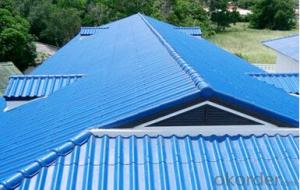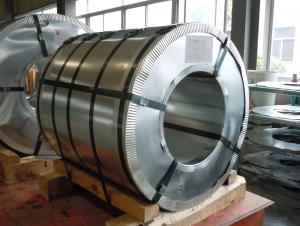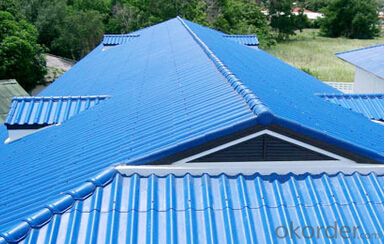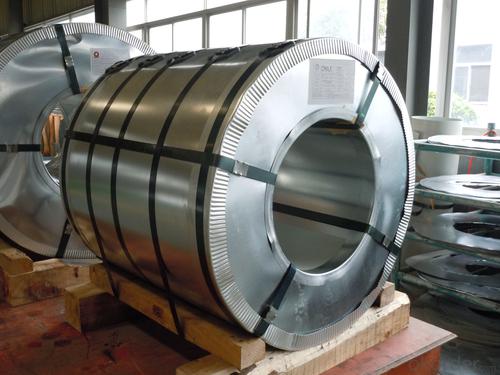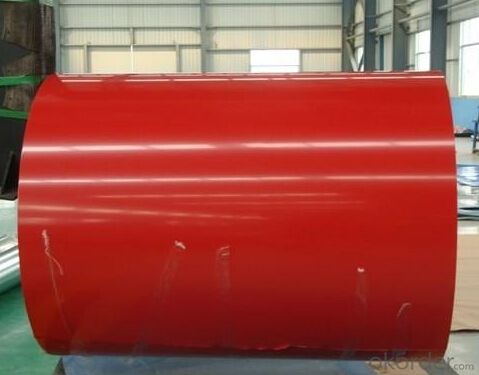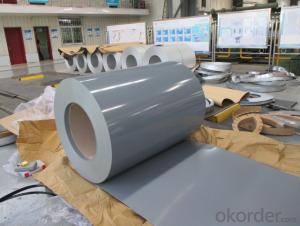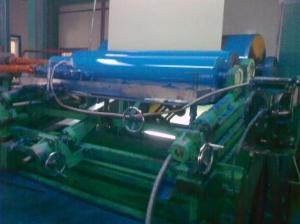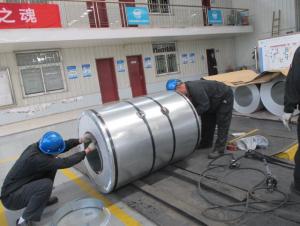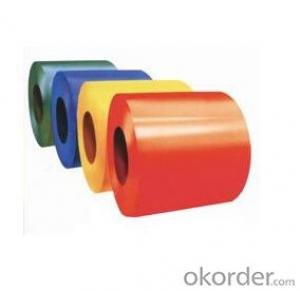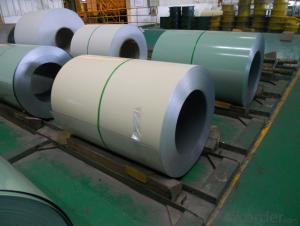PPGI 0.16-0.6mm 700-1250mm various color coated PPGI/PPGI steel coil cheap price
- Loading Port:
- Tianjin
- Payment Terms:
- TT OR LC
- Min Order Qty:
- 50 m.t.
- Supply Capability:
- 10000 m.t./month
OKorder Service Pledge
OKorder Financial Service
You Might Also Like

Prepainted galvanized color coated PPGI steel:
1.Specification .
| Raw material | SGCC, SPCC, DC51D, SGHC,A653 |
| Certificate | ISO9001.ISO14001.OHSAS18001 |
| Thickness | 0.16mm-1.5mm |
| Width | 1250mm or under |
| Tolerance | thickness+/-0.01mm |
| Surface treatment | galvanized / galvalumized steel sheets |
T Bending (top-coating) T Bending (back-coating) | ≤3T ≤4T |
| Anti-MEK Wiping | ≥100times |
| Zinc coating | 40-180g |
| Type of coating structure | 2/1 or 2/2 coating, or customized |
| Standard | GB/T12754-2006, GB/T9761-1988, GB/T9754-1988, GB/T6739-1996, HG/T3830-2006, HG/T3830-2006, GB/T1732-93, GB/T9286-1998, GB/T1771-1991, GB/T14522-93 |
| Color | customized |
| Application | Building industry ,structural use, roofing, commercial use ,household appliance,industry facilities,office buildings |
2.Mechenical property.
Chemical Composition | ||||||
GRADE | C | Si | Mn | P | S | Ti |
SGCC/DX51D+Z | ≤0.10 | ≤0.50 | ≤0.60 | ≤0.10 | ≤0.030 | ≤0.020 |
DX52D+Z | ≤0.10 | ≤0.50 | ≤0.60 | ≤0.10 | ≤0.030 | ≤0.020 |
SGCD/DX53D+Z | ≤0.10 | ≤0.30 | ≤0.50 | ≤0.05 | ≤0.030 | ≤0.020 |
SGCE/DX54D+Z | ≤0.10 | ≤0.30 | ≤0.30 | ≤0.03 | ≤0.020 | ≤0.020 |
DX56D+Z | ≤0.10 | ≤0.30 | ≤0.30 | ≤0.03 | ≤0.020 | ≤0.020 |
Structural | ≤0.20 | ≤0.60 | ≤1.70 | ≤0.10 | ≤0.045 | |
Mechanical Properties | ||||||
GRADE | Yield Strength MPa | Tensile Strength MPa | Elongation % | |||
SGCC(DX51D+Z) | ≥205 | ≥270 | - | |||
SGCD(DX53D+Z) | - | ≥270 | 38 | |||
SGCE(DX54D+Z) | - | ≥270 | 40 | |||
DX56D+Z | - | ≥270 | 42 | |||
3.Production process
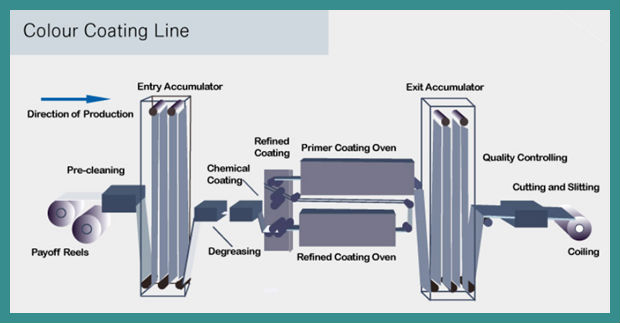
4 Sectional Structure of PPGI coil
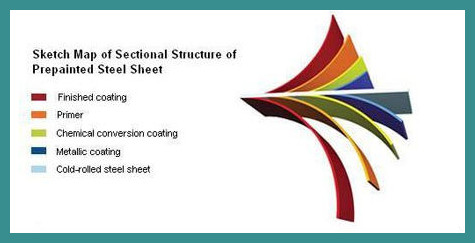
5.Container information
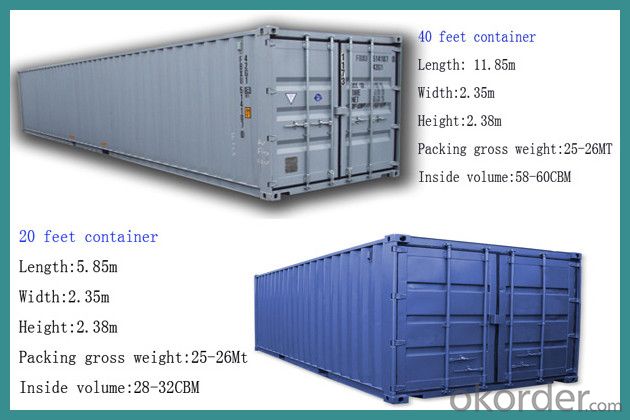
- Q: rust is not a issue. i was looking a D2 steel but heard story's of it chipping and breaking
- Ok, lets define what is Damascus steel. The modern Damascus is basically any steel that shows a pattern. Patterns are accomplished by 1. manipulating the crystal structure or 2. by combining 2 or more different alloys together. The blade you are looking at is referred to as a pattern welded blade. Damascus is only as strong as it's base components + heat treat and design. The strongest will be obtained by combining high carbon and low carbon steels. I do this by using steel cable. The patterns aren't real bold but are interesting none the less. To break it you must brake the hard steel and tear through the soft iron. The laminated stuff works the same way. For greater edge holding I use all high carbon, varying alloy content from simple carbon to chromium/nickle alloys. These are what you normally find in pattern welded blades. A fine pattern that has many lamination's crossing the edge will offer the best edge holding. Properly done one can get the DCE or damascus cutting effect where the soft layers wear away faster than the hard layers almost making the blade self sharpening. Is that blade good? Buy it if you like it, it won't compare to a well made hand forged blade but is much cheaper. sorry for the overload.
- Q: Is steel case ammo going to mess the gun up or is it just going to wear the parts out faster and if so how much faster? (I am not planning on reloading the rounds)
- True, brass ammo is hard to find. Your only real options in brass is Remington, Winchester, American Eagle, UMC, PMC, Fiocchi, and a sometimes a few various imports. Most of these can be difficult to find in large quantites and are costly. There was surplus from South Africa, Yugoslavia, Egypt and possibly Iran that was brass but almost all of it is difficult to find. The AK was designed around steel cased ammo. I shoot plenty of it through my guns and have little worry about any parts damage or accelerated wear. Other than the option of reloading, brass doesn't offer much that steel can't provide.
- Q: How can the quality of steel coils be ensured?
- The quality of steel coils can be ensured through a combination of rigorous testing, adherence to industry standards, and effective quality control measures throughout the manufacturing process. This includes conducting various tests such as chemical composition analysis, mechanical property testing, and surface inspection to verify the integrity and durability of the steel coils. Additionally, implementing strict quality control protocols, regular inspections, and continuous improvement initiatives are essential to ensure consistent and high-quality production of steel coils.
- Q: What are the main steel coil producing countries?
- The main steel coil producing countries are China, Japan, India, the United States, and Russia.
- Q: How are steel coils used in the production of electrical transmission poles?
- Steel coils are used in the production of electrical transmission poles as the primary material for constructing the pole itself. The steel coils are typically cut and shaped into the desired dimensions, then welded together to form the pole structure. This provides strength, durability, and stability to withstand the load and environmental conditions associated with electrical transmission lines.
- Q: How are steel coils used in the production of fireproof doors?
- Steel coils are used in the production of fireproof doors as they serve as the core material for the door's structure, providing strength and durability. The coils are typically shaped, cut, and molded into the desired door shape, then combined with fire-resistant materials such as gypsum or mineral wool to enhance the door's fire resistance.
- Q: aLSO, DOES STEEL C45 REFER TO THE CARBON IN IT?ALSO, WHAT IS AIRCRAFT GRADE PLYWOOD AND WHERE DOES ONE GET IT
- chromium nickle steel aka stainless steel exact amount of chrome and nickle will determine type/grade numbers Check the google for steel type/grade Never head of aircraft grade, however,, there is marine grade - normally baltic birch with waterproof glue and no defects i.e. knots, etc. Very strong (also quite expensive) but worth it for the correct applications
- Q: What is the process of recycling steel coils?
- The process of recycling steel coils involves several steps. First, the steel coils are collected from various sources, such as manufacturing and construction sites. Next, the coils are transported to a recycling facility where they undergo a thorough inspection and sorting process. The coils are then cleaned to remove any contaminants or impurities. After cleaning, the steel coils are shredded into smaller pieces and melted down in a furnace. The molten steel is then molded into new coils or other steel products. Finally, the recycled steel coils are tested for quality and can be used in various industries, reducing the need for new steel production and minimizing waste.
- Q: How are steel coils used in the production of storage tanks and silos?
- Due to their strength and durability, steel coils are essential in the production of storage tanks and silos. Typically made from high-quality steel, these coils undergo various manufacturing techniques to achieve the desired thickness and shape. In the production process, the steel coils are initially uncoiled and then cut into specific sizes and lengths to meet the requirements of the storage tank or silo design. Bending and rolling machines are then used to shape the coils into cylindrical sections, forming the main body of the tank or silo. After achieving the desired shape, the coils are welded together to create a continuous and secure seam. This welding process ensures leak-proof tanks and silos that can withstand the pressure exerted by the stored materials. Furthermore, steel coils play a crucial role in reinforcing the structure of storage tanks and silos. They are frequently utilized to construct the roofs, bottoms, and other structural components of these storage units. The strength and resilience of steel make it ideal for supporting the weight of the stored materials and resisting external forces. Additionally, steel coils can be coated or treated with protective materials to enhance their resistance to corrosion and extend their lifespan. This is particularly important for storage tanks and silos that store corrosive substances or are exposed to harsh environmental conditions. In conclusion, steel coils are a fundamental element in the production of storage tanks and silos, providing the necessary strength, durability, and structural integrity required for these storage units.
- Q: i have a pocket knife that is stainless steel that my mom found in the parking lot and i am wondering if oxygen peroxide will rust it? and if it dose is there something else i can use to get rid of the rust?
- Stainless does rust over time (EVERYTHING rusts it's called oxidation) Whenever something comes in contact with oxygen, the molecules will bond with the oxygen to form an oxide. Iron form iron oxide or rust which is reddish brown, apples turn brown after several minutes after it's been bitten. It all depends on the type of material used to manufacture the stainless. Stainless is made up of .2%-2% carbon, 11%%-28.5% chromium and iron. Some stainless is further advanced by adding other metals like nickel, molybdenum or niobium. Most stainless pocket knives are either normal steel coated with stainless or a cheaper form of stainless (it will have a high 300 number or very low 400 stamped on it). Other time, stainless will rust when a form of iron scratches the surface and contaminates the stainless, this is easily treatable if you get it quickly. Oxygen peroxide should not rust it, since the oxygen has already bonded with each other to form peroxide (2 oxygen molecules). It's the simplest form, but not the most stable (which means it could make your knife rust further). But I recommend steel wool or a scratch pad used to clean cook where (usually green or brown) to remove the rust.
Send your message to us
PPGI 0.16-0.6mm 700-1250mm various color coated PPGI/PPGI steel coil cheap price
- Loading Port:
- Tianjin
- Payment Terms:
- TT OR LC
- Min Order Qty:
- 50 m.t.
- Supply Capability:
- 10000 m.t./month
OKorder Service Pledge
OKorder Financial Service
Similar products
Hot products
Hot Searches
Related keywords
